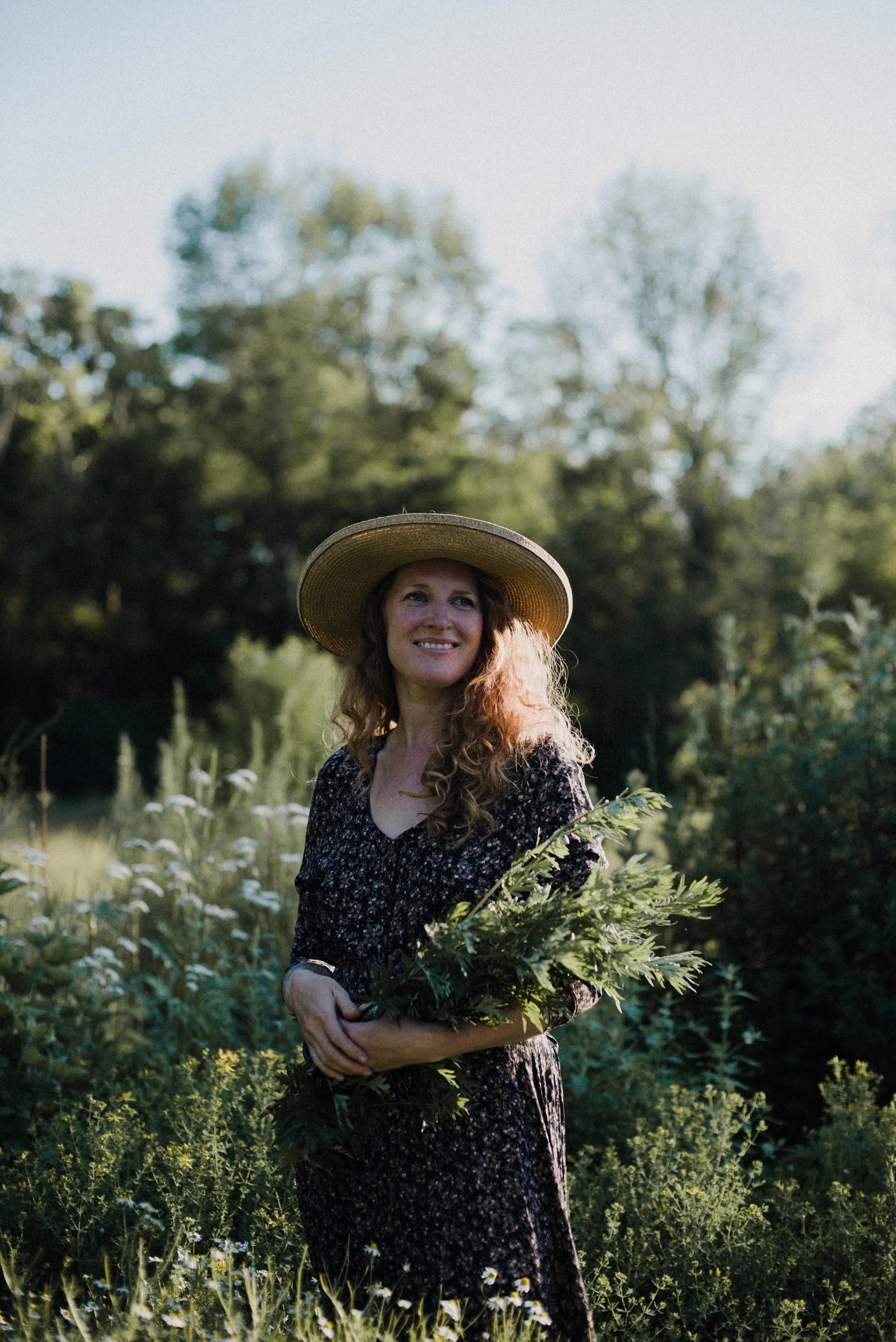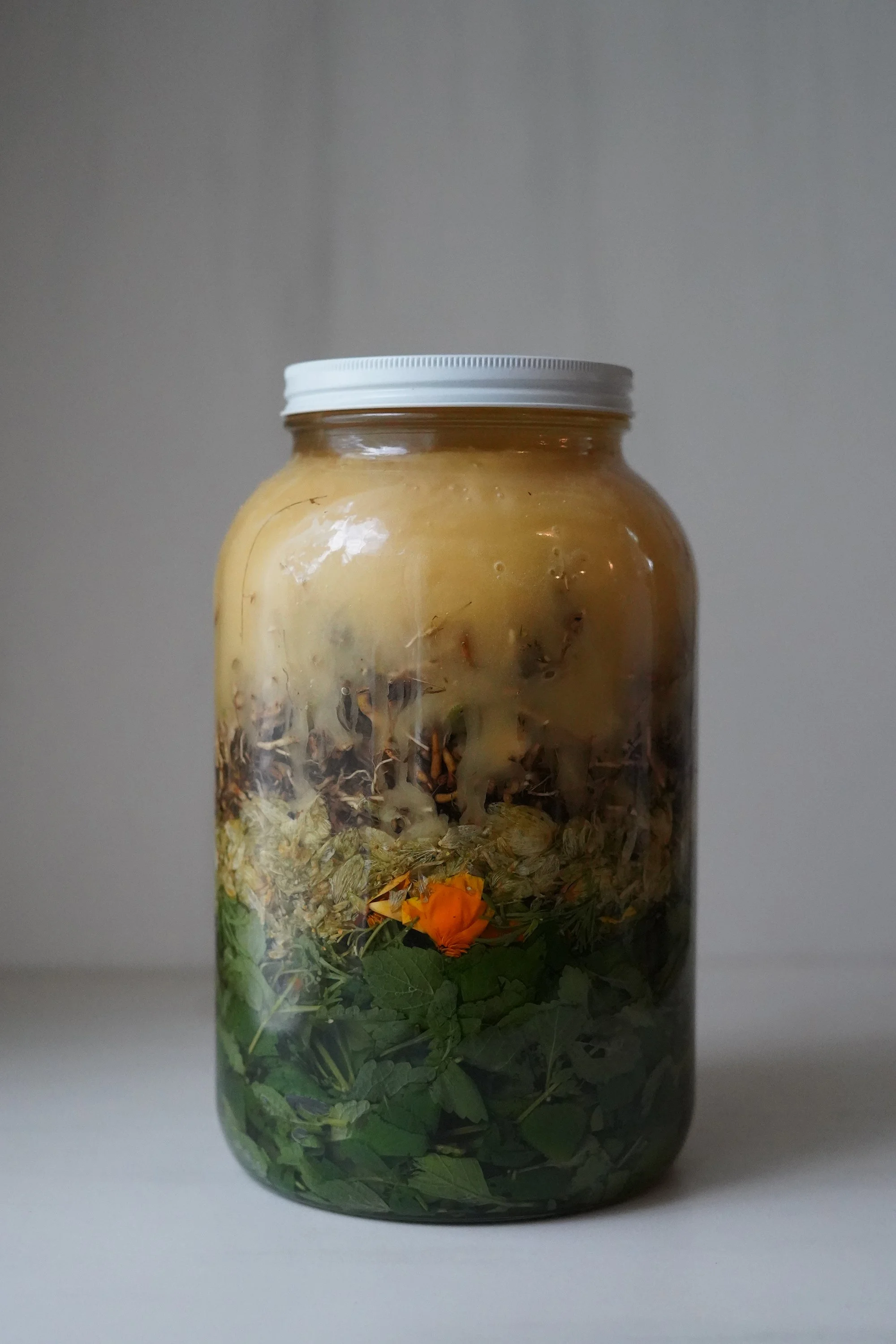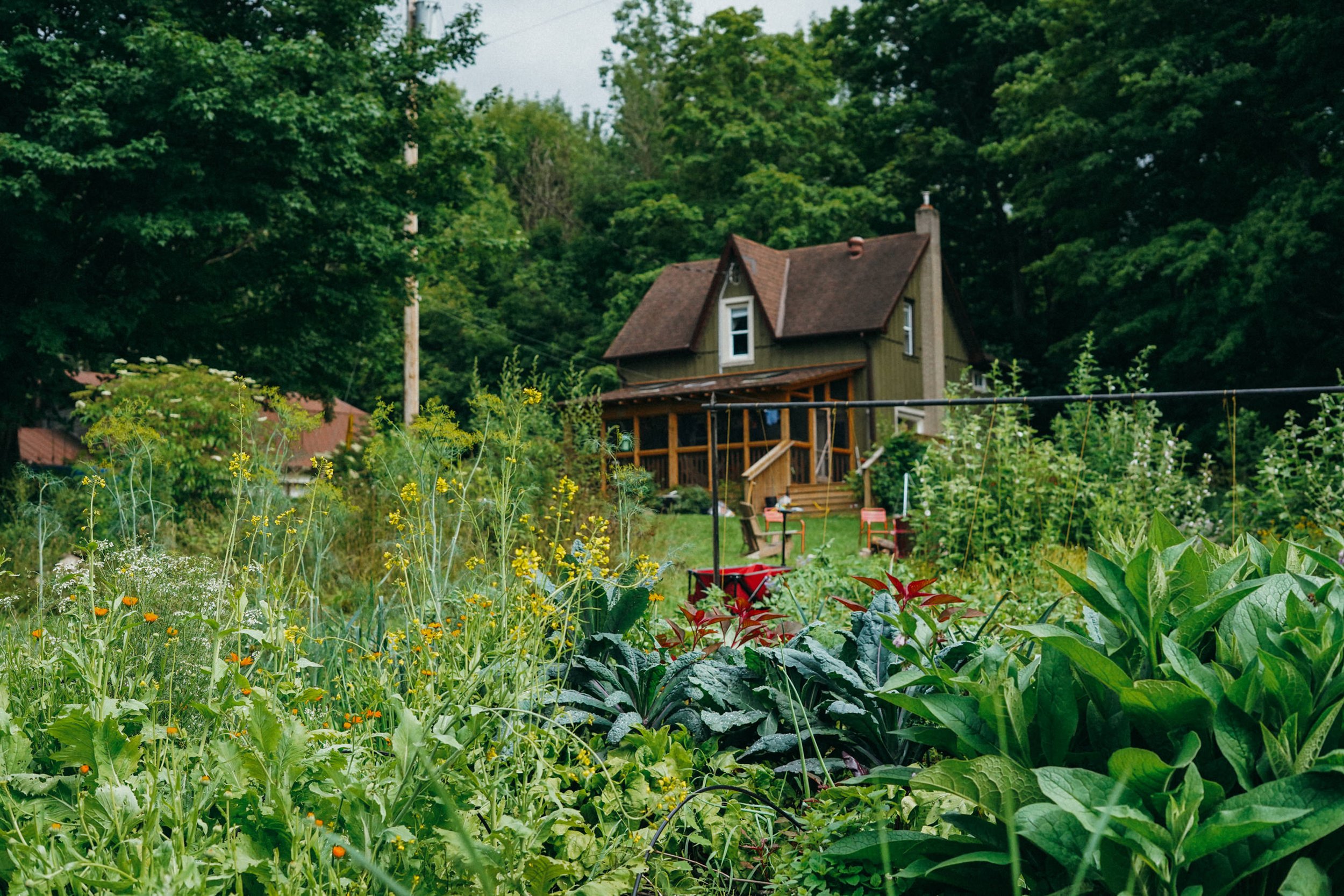Bloem Botanicals
Meet Sarah, a Clinical Herbalist nestled in the heart of rural Ontario. Photographed by Kelsey Vansickle, this interview offers a personal perspective on Sarah’s life and work, exploring her deep connection to the plant kingdom and her passion for crafting botanical remedies. From cultivating her own herbs to guiding clients on their healing journeys, Sarah shares her unique approach to herbalism, blending traditional wisdom with intuitive insights. Join us as we explore the inspiring story of Bloem Botanicals and uncover the magic behind Sarah’s small-batch creations.
Hello Sarah, how are you? Can you tell us a bit about yourself, who you are, where you’re based, and what you do?
Hey! I’m great, thanks for asking. I’m a Clinical Herbalist based in the small village of Kimberley, Ontario where I live with my artist husband and three children on a few acres. With the medicinal herbs we grow on our property and forage locally, I craft small batch botanical products including tinctures, salves and herbed honeys for retail that I sell online, in our apothecary shop and in a handful of local stores. I also work one on one with clients, supporting them on their healing journey through German New Medicine and the use of medical herbs, flower essences and homeopathic remedies. I run workshops from our gardens where we explore medicinal herbs, how to identify them, make products and use them in our daily lives.
Can you tell us more about your background and what led you to become a clinical herbalist?
I always felt at home in the woods and with the plants. And while I used naturopathic medicine, it didn’t occur to me that I could work in that field. I heard the word ‘herbalist’ as I was walking with a friend through Kensington Market in Toronto and felt a sudden shock through my whole body… I knew instantly this word encapsulated what I wanted to do with my life. I was working as a photographer at the time but was feeling unfulfilled.
What are some of the challenges and rewards of working as a clinical herbalist?
I love being creative and I love stories. Being a clinical herbalist allows me to be in a sacred space of trust where I listen to intimate, personal stories and then I then allow both my clinical knowledge as well as my intuition to take over and custom formulate herbal blends. The biggest reward though is witnessing the body language of my clients shift as they begin to recognize patterns in their lives and open up to the possibility of healing, of changing their story. I feel so honoured to be in that space with them.
How has your experience with naturopathic/homeopathic medicine influenced your approach to herbalism?
My upbringing with naturopathic medicine taught me that the body has all it needs to heal, it just sometimes needs a little support in finding its own path. This seems vastly different from the stories I hear of others who were taught to outsource their health and distrust in their own body.
What inspired you to create Bloem Botanicals?
I always saw myself making herbal products and helping people with their health. I found an old diary entry from when I was 12 years old talking about making bath oils and creams to ‘make people better’. The inspiration was very internal but also, I remember flipping through a magazine in my early 20’s that featured a mother and her grown daughters making soap in an old stone cottage in the UK and I fell in love that idea. And then of course, I had children and wanted to give them the wholesome childhood I had, using organic food and herbs as medicine.
Can you walk us through the process of growing, harvesting, and tincturing your herbs?
Most of the herbs I use, I started from seed, grew in windowsills throughout the early spring and planted out in my gardens or meadows. Many of them self seed or grow year after year so each year I’m able to add new herbs to the collection growing. Our gardens began as a manicured little patch, but now I’ve taken over small meadow; mowing paths and slowly replacing grasses with edible and medicinal herbs and pollinator loving plants.
At their peak, I harvest the leaves, flowers, berries or roots. Then I go through and select the healthiest, most vibrant parts and either bruise, finely chop or slice them into a large glass jar, covering them with alcohol. Sometimes, if bitter, I add a touch of raw honey. Other times I extra them in apple cider vinegar, depending on the plant and how it’s best extracted. These tinctures sit the dark for up to 12 weeks, being gently agitated regularly. Finally, they’re strained, taste tested and bottled.
If I’m using the herbs dried, I dry them on racks or hang them from the beams in my apothecary. Each herb prefers to be dried in its own way. Some, like marshmallow leaves, are happy loosely piled on mesh screening while others, like lemon balm, much prefer being dried on their individual stems, hung from the rafters with plenty of space between, and others still, like resin-rich calendula much prefer being dried in the dehydrator. These are stored in glass containers until they’re ready to be ground or crumbled and infused in rich, organic oils to make into salves and creams.
“Plants have an energy to them when they’re alive, they vibrate and communicate in such a beautiful way. After spending so much time with them in the gardens or along the river bank, I develop a relationship with these plants.”
Why do you choose to tincture your plants fresh, even though it’s not the most efficient method?
Plants have an energy to them when they’re alive, they vibrate and communicate in such a beautiful way. After spending so much time with them in the gardens or along the river bank, I develop a relationship with these plants. But when I first began working with my herbal teachers, making tinctures from dried plants, they felt so dead, empty, lacking. While they still hold so much medicine, there’s something missing in the final product that I feel is still there when I tincture plants fresh. Also, when purchasing dried plant material from growers, as the vast majority of herbalists and tincture companies do, the plants are rarely harvested with the same level of care as it’s just not feasible to do so in large quantities. Staying small batch then allows me to stay true to my values and to making the most potent herbal products I can.
What is the philosophy behind creating your herbal blends intuitively?
As I learned about herbal medicine, it felt more like remembering than anything else. Our ancestors were raised on herbal medicine since the beginning of humanity; we already have the knowledge within us. Also, as many indigenous medicine keepers have said, herbal medicine wasn’t found on trial and error, it was found by listening to the plants and what they were wanting to be used for. I often find that if I’m thinking of a specific client or even a specific condition and let my mind quiet, herbs will pop into my thoughts or twinkle at my from the garden. Following their lead I’ll gather a handful and walk back to the apothecary. It’s here that I’ll go through my books if the herb is surprising and stumble ‘randomly’ upon an obscure reference to exactly the condition I was looking to support.
What are some of the most popular products in your line?
Our Deep Sleep formula is our long standing number one product, closely followed by our Rose + Elderflower Facial Serum and then our Electuaries.
How has the COVID-19 pandemic impacted your business?
I think it’s been a great wake-up call to much of society who’ve learned to outsource their health and seek a quick fix for symptoms. They’re beginning to understand that the body’s best support is preventive medicine, not to mention, having some trusted and safe options at the first sign of cough or cold. Our workshops of building immunity through the early years of COVID were a huge hit, filled with primarily parents who’d never learned how to support a sick child without the advice of a doctor. Sharing information on basic herbal remedies and ‘old wives tales’ was both liberating and empowering for these parents; they left with jars of herbal honeys, vinegars and bath salts too support their whole family.
Can you tell us more about the workshops and classes you offer?
Our workshops often begin with a walk through the gardens where we taste and smell a variety of plants and get to know them in their natural form. Then we gather the herbs we want for either immune, nervous system, hormone, skin or digestive health and craft individual remedies for each person according to their needs. I also offer online and in-person classes on all of the above plus German New Medicine which explores emotional patterns of pain and illness. In person always offers and more rooted and sensory experience but I have so many followers who live afar so online is a great alternative and I’m happy to adapt to suite both.
What is the typical clientele you see in your clinic?
My typical client has had a long standing symptom or condition that they’ve tried addressing allopathically, often time also with supplements and while they’ve managed to ease symptoms here and there, they keep coming back and they feel they’re missing some element. I focus a lot on the emotional patterns of symptoms and then use herbs to support the tissues while we work on shifting those emotions. Then I also use flower essences and homeopathic remedies to support the emotional/perceptual shift. Typically, they have deep realizations in the session, connections they’ve never thought of before. When they come to me, they’re open to anything.. they’re exhausted and emotional and ready to give up. They’ve maybe never shared their stories in this way before and that in itself is healing.
What are your plans for the future of Bloem Botanicals?
I see myself running workshops, classes and the clinic full time, while my apprentice takes over the product line.. which will always stay small. I want to keep growing our own herbs and not have to expand the gardens much beyond what they are now. I want the gardens to be a place of refuge and exploration, empowerment and joy. The clinic and my own approach to health I see as becoming a system in and of itself, possibly an approach I can teach others and expand.
How does living in a small village influence your work as a herbalist?
Being in a small village means we get to host community potlucks in our garden, which means neighbours are regularly asking for a pinch of this and that. It also means that I’ve become known as the local witch or healer, lol.
Can you describe the role your husband plays in supporting Bloem Botanicals?
The steady rock. He helps where he can but mostly he offers consistent emotional support as I plunger deeper and deeper into this work. He beside table is also full of his fav products and tends to gift products to friends and strangers alike who are in need of supports.
How do you balance your work life with your family life?
Work/family balance is a shifting thing, but involving my children in the business has been wonderful. They’ve grown up in the garden with me, planting seeds, harvesting flowers, sweeping the apothecary floor. One of my three children as an affinity for plants and has plans to work along side me and possibly take over the business one day. The other two help as asked and all three often come to events with me or help me run the workshops. It’s nice being out with them when someone recognizes me on the street and tells me how much my product, workshop or consultation has helped them. My two daughters witnessed this the other day and were so proud, “That must be such a good feeling when someone tells you that you’ve helped them so much!”. We homeschooled full time until recently so now that they’re in a daily program, my work/fam balance has been much better.
How do you see the role of herbalism evolving in modern healthcare?
I would love to see multiple disciplines coming together in practice; doctors prescribing herbal medicine, reiki, nutrition and homeopathy. There are several medical herbalists working one on one with open minded doctors in Canada and I’d love to see that grow. I also envision myself speaking at medical conferences in the future, speaking to both emotional patterns of illness as well as herbal and energetic supports. I imagine future pandemics coming with public announcement recommendations of herbal foot baths, tinctures, vitamins, nutrition and other remedies, and where fear is replaced with empowerment.
Are there any specific research projects or collaborations you are interested in pursuing?
Currently I’m part of group of German New Medicine practitioners researching and exploring emotional patterns of peri/menopausal symptoms and how our experiences as women along with society’s expectations on the aging woman impact our menstrual cycles and our experience of peri/menopause.
Photographer - Kelsey Vansickle
www.kelseyvansickle.com @vnskl
BLOEM BOTANICALS
GNM Informed Clinical Herbalist
Small batch botanicals for peace of mind and body
www.bloembotanicals.ca @bloembotanicals



































